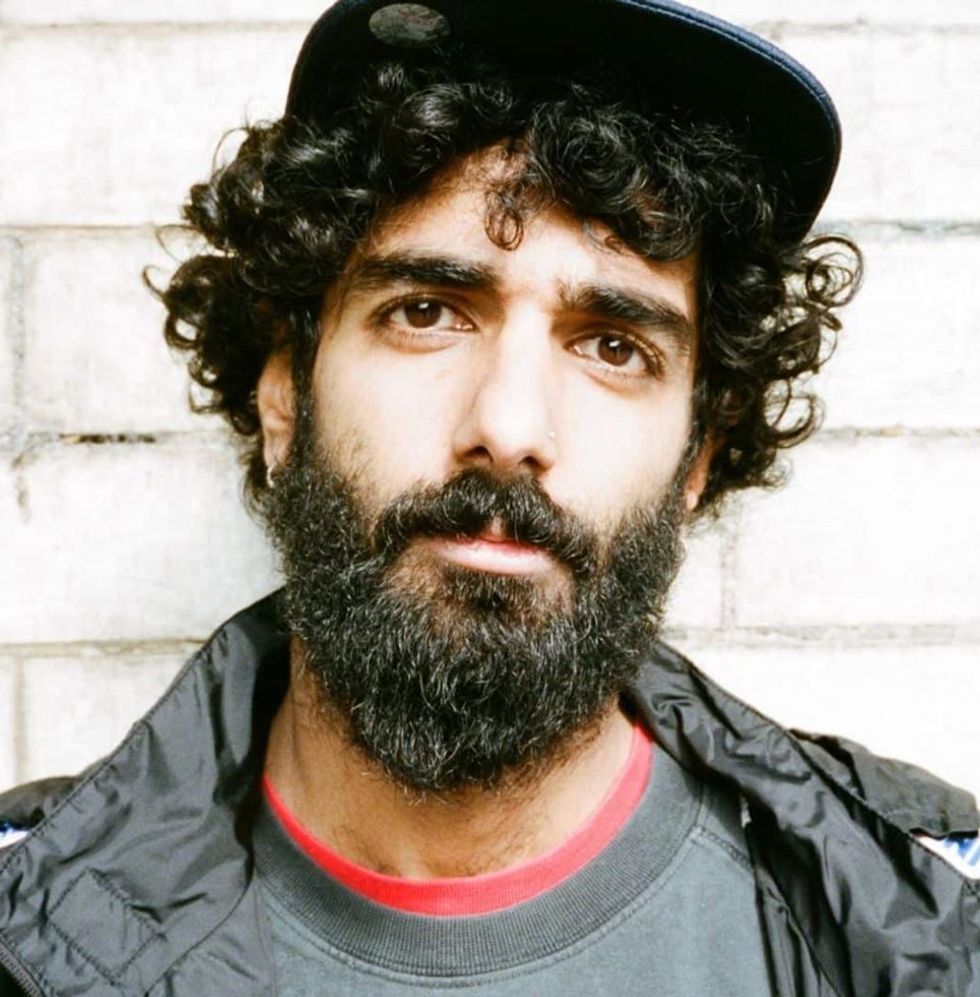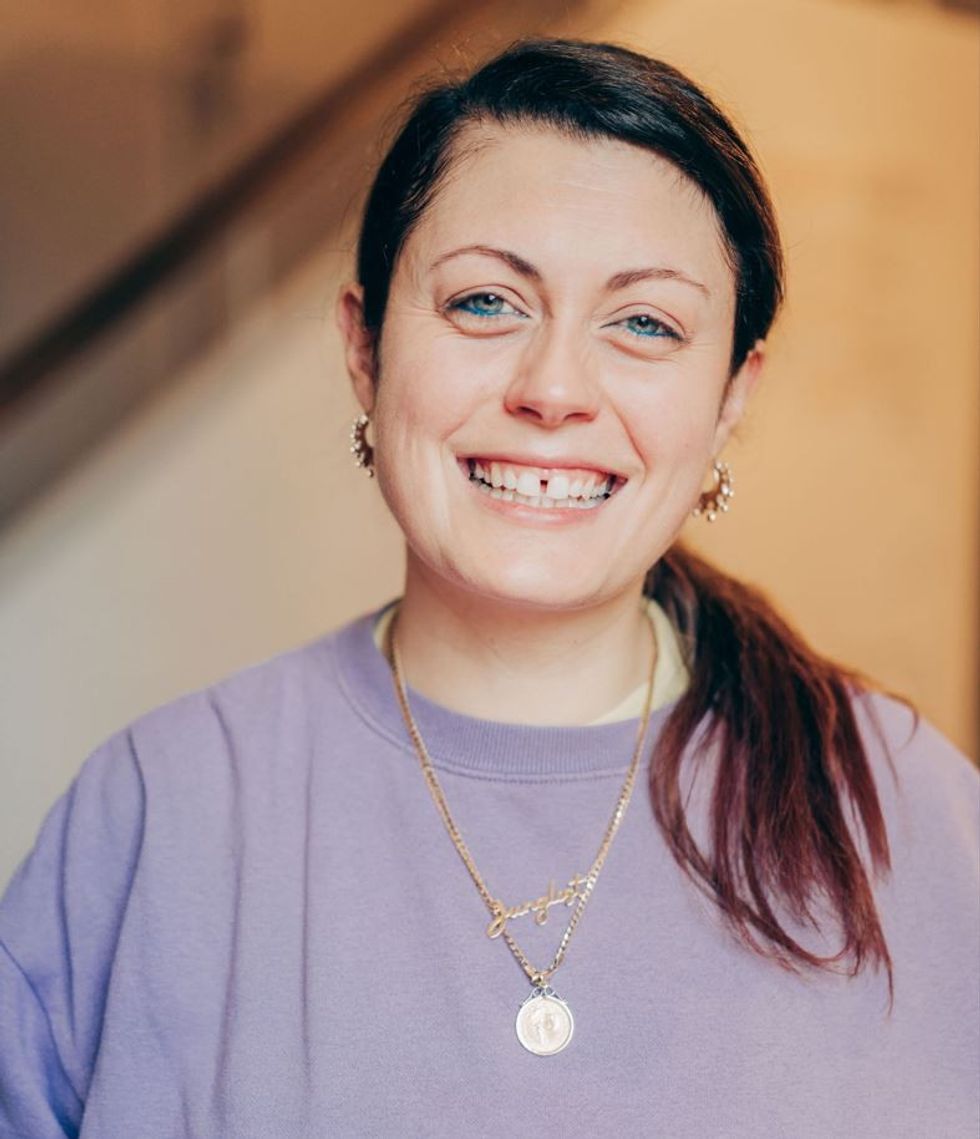GATE Theatre’s Brassic FM, which opens next Monday (4), will showcase an “unfiltered and unique” take on the working class, as seen through the lens of a pirate radio station.
Co-created by poet Zia Ahmed and artistic director Stef O’Driscoll, Brassic FM is described as a love letter to working class culture and music and hopes to explore the perspectives of those living on the edge and whose lives aren’t under the spotlight.
Brassic FM is set in a radio station and features about 30 different characters, including Amir, who chronicles the perils of living as an undocumented worker in London, and Amina, who is in a quest to find how life was for her family when they first moved to the UK from Pakistan.
In an interview with Eastern Eye, Ahmed and O’Driscoll revealed what inspired them to tell this story as they dwelt on the persisting class divide in Britain.
Ahmed said the idea was germinated when he saw a lot of south Asians, particularly Bangladeshi people, were disproportionally affected during Covid pandemic as many of them were frontline workers. That observation – “married with this idea of being proud of successful middle upper-class Asians such as our Indian-origin prime minister” – opened the conversations around layers of class and their precarities, he said.
“At the heart of the show is a radio station that is a home for inner-city working-class Londoners. It feels like a community for people who feel they don’t have financial privilege,” said O’Driscoll.
Brassic FM touches on racism, class injustice, the implications of sexual assault, parental loss as well as colonisation.
Actors Zakiyyah Deen, Zainab Hasan and Jonny Britcher comprise the cast and, together, they portray 30 characters.
“The reason why Brassic FM works is because the concept of radio station allowed us to follow many different characters, and through them, we can say so much about these things and issues going on in the world - whether that’s workers’ rights or immigration policies,” O’Driscoll told Eastern Eye.

She added, “It’s a real collaborative effort. We’ve got members of the company coming up with new ideas saying, ‘this is not talked about, and we really need to include it in this show’. And that’s exactly what we are talking about in the play – the lives of undocumented workers.
“Some of it is on the nose, but some of it is beautiful and subtle.”
Both Ahmed and O’Driscoll said they feel class as a subject is tiptoed around - whether that is the arts, movies or society, in general.
“People who have power (in theatre) don’t want to acknowledge it. And even when it got spoken about, it was from lens of those people who don’t have the lived experience of being under privileged. I find it challenging to watch theater that feels in[1]authentic,” O’Driscoll said.
“Talking about class in theatre is complex as most people don’t know how to talk about it, because they are not from those backgrounds. It’s very few of us here,” she said, as she noted how there are “multiple layers of financial, social and cultural barriers” that some face daily.
She noted that just “7.9 per cent of (those in the) arts (world) are working class” while the rest are from the middle or upper classes.
O’Driscoll is an award-winning theatre director while London-born word poet Ahmed explores ideas of identity and belonging and is part of the London Laureates. He was shortlisted for London’s Young Poet Laureate in 2015-2016 and also dabbles in playwriting.
Ahmed cited how the “experience of a black Muslim man in Britain will be different from a Muslim man from Pakistan or India”. Whether it was class, race, religion or faith, they are not separate, but are “flowing planets” entwined and intersected on many levels, he said. “Brassic FM’s intent was to talk about all these aspects and their effects combined, rather than seeing them as separate factors, he added.
Ahmed has mixed feelings about his own experience as a Muslim man in Britain.
“In a city like London I feel that it’s a blessing that there are mosques and places of worship where I can openly practise my faith, but in terms of policies, government and general sentiment, it doesn’t feel great.
“More worrying is the public policing Muslims and their faith in a systemic way. It’s not doom and gloom, but there is also this stressful energy about being able to be openly and visibly Muslim,” he said.
Explaining the peculiar title, Ahmed said, “I am into puns. In different regions, brass also means having no money in your pocket. Since the play is about a radio station for such people, I did a little word play and we came up with the title Brassic FM.”

Ahmed said he found the “spoken word the most interesting thing”, a love that began during his growing up years.
He said, “My mom and dad used to sing ghazals or recreate scenes from films. The closest thing to live performance I had been to as a child was a circus show. But I feel that’s not unique, and it is something a lot of children experience. I didn’t think of arts as a viable career until I got to know more about arts and theatre in school.
“I think I fell in love with spoken words that needed to be performed live - the way you lay out poetry on page. But, for me, the thing I love about is hearing it out loud. That is something that has excited me a lot.”
O’Driscoll was influenced by her father who was a fan of the arts and theatre. She said, “It was the only thing I’ve really enjoyed at school. I wasn’t quite academically inclined. I soon found a cheap youth theatre where I had to spend just two pounds a session and even if someone didn’t have the money, they still let the person in.
“I was really rubbish at being told what to do as an actor, so I naturally fell into directing,” she said.
Ahmed said the south Asian experience in British society is still not spoken much about in theatre, and said despite being so many plays, there are not many stories that are truly authentic and rooted in the UK.
O’Driscoll added that things are improving with the likes of Pooja Ghai from Tamasha Theatre bringing south Asian stories on a bigger stage.
Brassic FM is on at Gate Theatre from next Monday (4) until September 30.






 A compelling premise, layered and unpredictable charactersAMG
A compelling premise, layered and unpredictable charactersAMG Anyone who enjoys a gripping story with a diverse cast and unexpected twistsHarperFiction
Anyone who enjoys a gripping story with a diverse cast and unexpected twistsHarperFiction








 The Story Teller by Ley Roberts
The Story Teller by Ley Roberts Summer Exhibition coordinator Farshid Moussavi, with Royal Academy director of exhibitions Andrea Tarsia in the background
Summer Exhibition coordinator Farshid Moussavi, with Royal Academy director of exhibitions Andrea Tarsia in the background An installation by Ryan Gander
An installation by Ryan Gander A sectional model of DY Patil University Centre of Excellence, Mumbai, by Spencer de Grey
A sectional model of DY Patil University Centre of Excellence, Mumbai, by Spencer de Grey Rituals and Identity and Theatre of Resistance by Arinjoy Sen
Rituals and Identity and Theatre of Resistance by Arinjoy Sen
 An explosive new play that fuses biting satire, history and heartfelt storytellingPleasance
An explosive new play that fuses biting satire, history and heartfelt storytellingPleasance
 Lunchbox is a powerful one-woman show that tackles themes of identity, race, bullying and belongingInstagram/ lubnakerr
Lunchbox is a powerful one-woman show that tackles themes of identity, race, bullying and belongingInstagram/ lubnakerr She says, ''do not assume you know what is going on in people’s lives behind closed doors''Instagram/ lubnakerr
She says, ''do not assume you know what is going on in people’s lives behind closed doors''Instagram/ lubnakerr
 He says "immigrants are the lifeblood of this country"Instagram/ itsmetawseef
He says "immigrants are the lifeblood of this country"Instagram/ itsmetawseef This book is, in a way, a love letter to how they raised meInstagram/ itsmetawseef
This book is, in a way, a love letter to how they raised meInstagram/ itsmetawseef